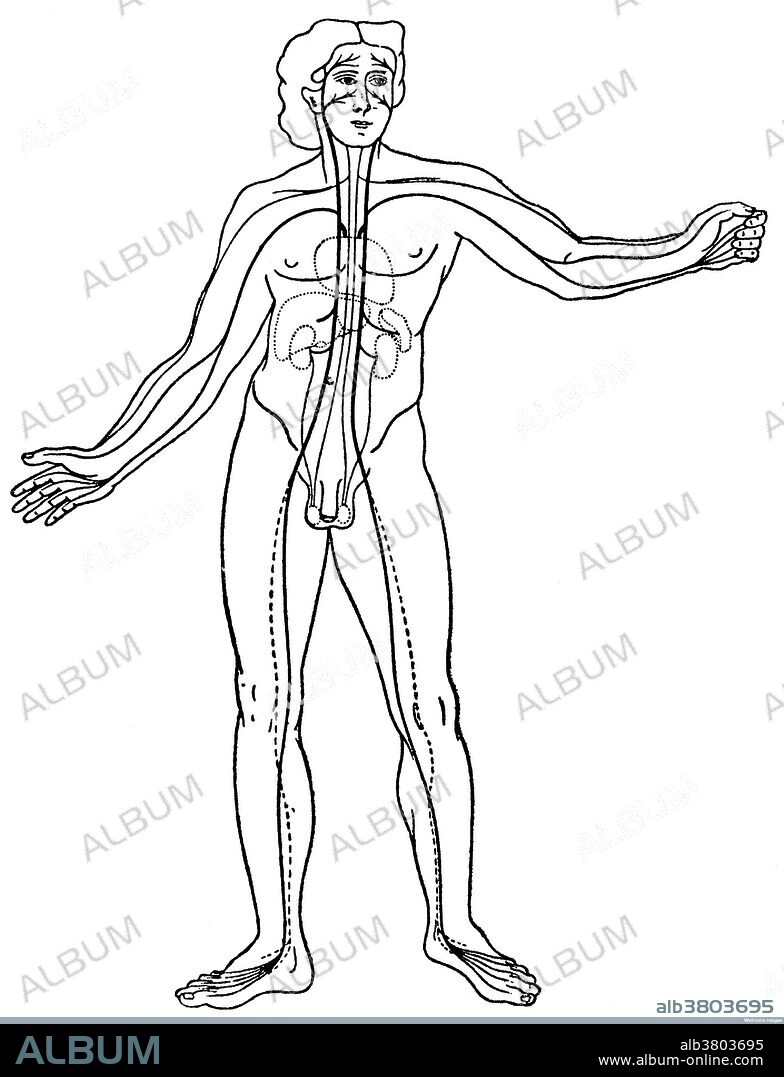alb3803695
Vascular System, Diogenes of Apollonia, 400 BC

|
Add to another lightbox |
|
Add to another lightbox |



Buy this image.
Select the use:

Title:
Vascular System, Diogenes of Apollonia, 400 BC
Caption:
The vascular system as described by Diogenes of Apollonia, circa 400 BC slightly modified from E. Krause: "Diogenes Von Apollonia" (Posen: 1909). Diogenes of Apollonia (425 BC) was an ancient Greek philosopher. Diogenes believed air to be the one source of all being, and all other substances to be derived from it by condensation and rarefaction. He asserted that air, the primal force, was intelligent. The nature of the universe is air, limitless and eternal, from which, as it condenses and rarefies and changes its properties, the other forms come into being. He is said to have believed that there was an infinite number of worlds, and infinite void; that air, densified and rarefied, produced the different worlds; that the Earth was round, supported in the middle, and had received its shape from the whirling round of the warm vapors, and its concretion and hardening from cold. The longest surviving fragment of Diogenes is that which is inserted by Aristotle in the third book of his History of Animals. It contains a description of the distribution of the blood vessels in the human body.
Credit:
Album / Science Source / Wellcome Images
Releases:
Model: No - Property: No
Rights questions?
Rights questions?
Image size:
3215 x 4200 px | 38.6 MB
Print size:
27.2 x 35.6 cm | 10.7 x 14.0 in (300 dpi)
Keywords:
5TH BCE • 5TH CENTURY B. C. • 5TH-CENTURY BC • ANATOMICAL • ANATOMY • ANCIENT • ANTIQUITY • BLOOD CIRCULATION • BLOOD SYSTEM • CARDIOVASCULAR SYSTEM • CELEBRITIES • CELEBRITY • CIRCULATORY SYSTEM • DIOGENES OF APOLLONIA • DIOGENES • FAMOUS PEOPLE • FAMOUS • FIFTH CENTURY B. C. • FIFTH CENTURY BC • GREEK • GROSS ANATOMY • HISTORIC • HISTORICAL • HISTORY • HUMAN BODY • HUMAN FIGURE • IMPORTANT • MALE • MAN • MEDICAL • MEDICINAL • MEDICINE • MEN • NOTABLE • SCIENCE • VASCULAR SYSTEM • WELL-KNOWN
 Pinterest
Pinterest Twitter
Twitter Facebook
Facebook Copy link
Copy link Email
Email
